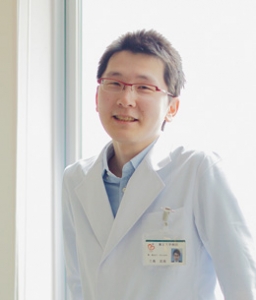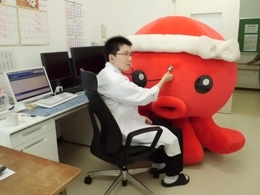To Provide More Appropriate Medical Services

Eikan Mishima M.D., Ph.D. Assistant Professor, Department of Community Medical Supports, Tohoku Medical Megabank Organization (ToMMo)
For four months from June 1, 2013, I worked as an internal medicine physician at Shizugawa Hospital in Minamisanriku Town as ToMMo clinical fellow of Tohoku Medical Megabank Organization (ToMMo). The original Shizugawa Hospital was washed away by the tsunami, and the hospital now operates out of two locations: 1) Minami Sanriku Public Medical Clinic, which only has outpatient functions; and 2) Shizugawa Public Hospital, which uses a clinic with unused beds in Yoneyama Town, Tome City as its hospital ward. I was principally in charge of outpatient care. In Minamisanriku Town, about half of the residents are still forced to live in cramped temporary housing. Furthermore, it is a fact that the Great East Japan Earthquake has further accelerated the pace of the already rapid aging of the population. This comes in the wake of what must have been a truly difficult change in environment for the elderly, relocating from flat lands by the sea to the mountains. As all of this is going on, it was impressive to see the local community members and Minamisanriku Town's mascot character "Okutopasu (Octopus)-kun" enlivening the mood of the town. Incidentally, I lived near the medical clinic during my assignment. There were no more than a few shops in my neighborhood. In fact, because I myself do not cook, every day I kept going out to eat sushi at one of the handful of restaurants in the town. Since the restaurant kept giving me something on the house every time that I went, I felt almost sorry. At the same time, living in the same environment as the local people made me realize many challenges. For example, reducing salt intake is fundamental to preventing high blood pressure. The people in this town, however, have a tendency to eat salty foods by preference, and this was a little worrying.

Examining Minamisanriku Town's mascot character "Okutopasu (Octopus)-kun"
Community medicine naturally requires that physicians have knowledge also in areas other than their areas of specialty -especially knowledge in elderly care. With my knowledge being tested on the medical treatments for such illnesses as dementia as readers may imagine, as well as on nursing care, this experience made me realize once again that community medicine is turning increasingly into elderly care. Moreover, taking into consideration the current situation of community medicine in which a small number of physicians looks after many patients, it can be said that a major task ahead is to develop a system which will be able to make up for the skills that physicians are lacking.
Four months into my assignment, I handed over my duties to my replacement and returned to the university. Even after I have returned, other physicians have been going to Shizugawa Hospital for four-month assignments. What's important, I would say, is that we continue to send the necessary manpower and resources to the sites as appropriate.
(Jan., 2014)
Profile
Eikan Mishima M.D., Ph.D.
Born in 1981 in Kanagawa Prefecture. Graduated from the Tohoku University School of Medicine in 2006. After his residency at Osaki Citizen Hospital in 2007 and practice at The University of Tokyo Hospital in 2009, enrolled at the Tohoku University Graduate School of Medicine in 2010. Received his M.D. in nephrology, endocrinology and vascular medicine in March 2013. In his current post since April 2013. Practices nephrology, endocrinology and vascular medicine at Tohoku University Hospital.
This interview was originally conducted in Japanese for the Tohoku University Hospital public relations magazine "hesso" Vol. 2.
Links
Tohoku University Hospital
SHIZUGAWA Public Hospital (Japanese)
